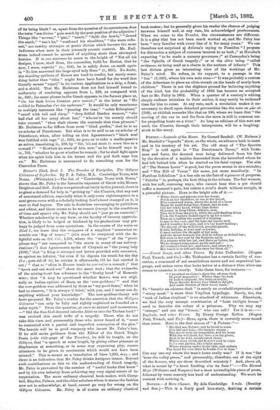POETRY.—Legends of the Heart. By Gerard Bendall. (W. Holmes.) Mr.
Bendall's " legends" show, on the whole, an advance both in taste and in his mastery of his art. The old story of "The Spectre Ship" is told again in "The Dutchman's Doom," with fresh- ness and force, the doomed man being delivered from his fate by the devotion of a maiden descended from the betrothed whom he had left behind him when he started on his fatal voyage. The aim of "The Demon Lover" is good, but the poem seems to us a mistake; and "The Hill of Venus" the same, yet more manifestly. "In Partibus Infidelium" is a fine ode on the fate of a pioneer of progress. " Zuleika " is, perhaps, the best thing in the volume. The fair woman, with her soft, caressing ways, who cannot bear that a pet should suffer a moment's pain, but orders a rival's death without scruple, is a powerful picture. Here is the bright side of it :— "White doves and pigeons over her hover,
Perch on her shoulders, or coo at her bresst,
Blue-reined and warm, where the &ad of a lover Might lie world-forgetting, forgot, and at rest.
Out her white hand, whiter than dishes Of porcel in from Chine, delicate, rare, They feed from the gran, while the gold-flashing fishes From the fountain looked eagerly up for a share. Then on a sudden the sound of a bleating Comes to her ears, and the tone she knows well, And it troubles her eyes, and sets her heart beating ; 'Tis the cry of the well-loved, graceful gazelle. Gentle Znleika, en kind and so tender, Cannot endure the thought of her pain, And she moves towards the stall to release or defend her ; But soon to her seat by the fountain again
Ste returns with her pet, and there as before, her Wiiite-winged comramons nestle and call—
All creatures trust her, and know, and adore her, Her touch is so soft and she cares tor them all."
Forest Songs, and other Poems. By John Todhunter. (Kegan Paul, Trench, and Co.)—Mr. Todhunter has a certain facility of exe- cution, a command of not unmelodious metre and not unpoetical lan- guage, and writes verse that looks better at a distance than when ODO comes to examine it closely. Take these lines, for instance :— "I breathed on Coma's shore the odorous dusk Of great magnolias ! Whiter than the tusk Of Indipn elephant, like beakers bright, Their Bacehic flowers they lifted in deFght, And made libation of their wiLey musk.'
To "breathe an odorous dusk" is surely an overbold expression ; and " winey musk" is more than Virgilian hypallage. Surely, too, the "tusk of Indian elephant" is no standard of whiteness. Elsewhere, we find the very strange combination of "faint twilight lemon" used to describe the colour of a primrose. Why we may say "orange," and not say "lemon," who can tell ? Yet it is so.— Daphnis, and other Pc erns. By Henry George Hellen. (Kepi], Paul, Trench, and Co.)—Here, again, there is certainly more sound than sense. Here is the first stanza of "A Picture :"— " His God was Nature, and be loved to roam O'er hill and dale,—the happier unseen ; The wo..ids were his companion, and his home With the will herd, far 'hove a va ley green, Rich in its wild, uncultivated sheen, Where every shrub and flower's seen to reign In Ps own garden, like a fairy queen, Whose winning smiles invite thee, and enchain Thy heart fur ever there to fondle o'er its fane."
Can any one say where the man's home really was ? If it was "far 'bore the valley green," and presumably, therefore, out of the sighs of the flowers, why are these described minutely ? And, above all, what is meant by "a heart fondling o'er its fane ?"—The Blessed Hope (Williams and Norgate) has a most unintelligible piece of prose, followed by verse scarcely less hard of understanding. We must be content with noticing it.


































 Previous page
Previous page